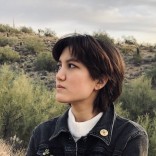Exit Stage Left
Meg Robson Mahoney
Days before the start of school, I’m here to clear myself away.
I walk up the ramp to my stage, past a 10-foot poster I hung for my students—and myself—when the stage was new: I dance because I want to scream. The walls seem to echo the embedded noise of children running up the ramp to shed their classroom stillnesses along with their shoes and socks, disheveled or neat, before rocketing into the space.
I’m holding my decision to retire so tight I can barely breathe. I need to heal. If I take sick leave, with substitutes in my place, the kids will miss the groundwork they need early in the year. The dance program will die. Quitting, so a new dance specialist can take my place, is my best chance to save the program.
I open the door and look across the stage. Its emptiness welcomes me, as it always has, with its glistening, gleaming, polished wooden floor, sprung for dance and built for us. Years of children have burst through the door to slide across the slippery space, wide enough for each to lie down, stretch out, spin, roll, creep, and reach. To hop and skip and leap in the common language of dance, creating moves to bring to life numbers, words, and notions learned at desks.
Children with wonderful names: Ayub, Shavayla, Hishaam, Zayla, and hundreds more. Children who speak Spanish, Ilokano, Amharic—languages from across the country and around the world, from places that have squeezed out refugees over the years: Eritrea, Ethiopia, Sudan, Guatemala, Cambodia. Children whose statistics I tallied endlessly for grant proposals. 65% speak English as a second language; 65% eat free-and-reduced-price lunches. Most have substandard scores on standardized tests as they work to conquer English in a new culture with parents burdened by life. These children, with so many reasons to scream, ran up the ramp every day to shed more than their shoes. They shed their urge to scream and came to dance.
They’ll come again next week. And be welcomed by someone, I hope, who will understand how kids need to move.
I flip the light switch just inside the door where Eli—a fifth grader fresh from the bilingual center with barely a word of English—watched our chaotic commotion. An intervention specialist stepped in behind him, to run with him if he ran. Eli backed himself against the wall and watched the class dance the Virginia Reel, an old American dance with partners in facing lines, sashaying and laughing down the middle and weaving under an arch of arms. Next day, halfway through the motion and chatter of the dance, I invited him to be my partner. He stepped forward. A few turns later, I stepped out and partnered him with a boy who would become a friend. The two of them laughed as they ran to keep up with the dancing line. When his teacher stepped in at the end of class, he shook his head in disbelief.
Standing now where Eli stood on his first day, I drop my purse, release the velvety curtains from bindings I tied last June, and brush a few spiders from their summer nests. To clear my head of regret, I prop open the outside door.
Noisy ghosts rush in.
They knocked on this door every day at recess.
“Can we come in?”
“Can we dance today?”
“Ms. M, will you watch our dance?”
They came alone or together, to dance or watch. Tossing their shoes in the hall, they rummaged in closets and pulled out drums, rhythm instruments, and colored plastic spots to create jumping pathways and to dance on the edge between work and play. Some brought music to build their own dances amidst the clamor.
“How many minutes of recess do we have left?”
For some, their behavior had cost them recess; they had to report to me.
They sat by the wall in penance and watched kids dance.
One might ask, “What are these kids doing here?” “Do they come every day?” “Can I come back tomorrow?”
At the ring of the bell, everyone scrambled to put things away, grab shoes, and race for class.
Now, I leave the outside door open and cross the stage through bright splashes of morning sunlight from windows at the top of the backstage wall. I unlock the soundproof panels downstage to feel the fullness of the space again. I guide the heavy doors into their stage-left nook. Beyond and below the edge of the wooden floor is the lunchroom, dark and silent, empty of the chatty audiences that gathered to watch the children perform.
I open one of the closets that holds props out of sight. It’s filled with bins of stretchy bags, tossed in helter-skelter at the end of a class last spring. David tumbles into mind. David, a hostile loner, new to school, taller than his fifth-grade peers. His condition had a name, but it was the symptoms we had to work with every day. He swore, picked fights, lashed out at anyone nearby. But at the end of a sullen year, something crystallized for him from inside a stretchy bag. As his class was building a dance based on Coast Salish legends, I asked him to portray a forbidding tree from inside a full-length, polyester bag. Anonymous, unseen, fears hidden, he expanded and contracted in ominous shapes. On performance night, he gathered family and friends to watch him perform inside and outside his fabric shield. Next morning, after witnessing her son’s emergence, his mother brought me a bright bouquet of flowers.
I organize each closet. Fold and pile the bags. I separate brightly colored scarves, warm from cool. Untangle and sort the ribbon-sticks, stick-side down in their broken-bongo-drum containers. Straighten the tumbao and conga drums to wait quietly alongside baskets of tambourines and bells for the return of the din of children learning the difference between noise and music.
The last closet holds hula hoops. Memories of Hank roll out. Hank was eight, one of a tiny class of kids on the Autism spectrum. Each day he was due, I hurried lunch to secure the space—to put away props and tape the lights with duct tape in advance of his running, circling entrance, as he flipped switches, dumped baskets, and pulled props from their shelves. Overwhelmed by noise, he spent entire class periods sobbing on the floor, distraught by the sound of his occasionally screaming classmates. Some days, he hid in a nook and refused to come out.
Often at the end of class, I passed out hula hoops, cued soft music, and joined voicelessly. Each of us did whatever we chose. Everyone had a hoop, sometimes even Hank—to carry, twirl, roll, step through, run with, or put on their hips and wiggle. One day, as I traced the circle of a hoop with one hand, I felt Hank’s gaze from a foot away. His eyes rarely met anyone else’s, so I kept mine indirect. I moved the hoop in a circle around my body. He did the same. I lifted it high. So did he. I eased off, and he continued. I copied him. The bubble of our shared space shrank, as he and I traded leadership in a single sphere. Finally, our eyes met and held. The dance continued. Peripherally, I noticed Marnie, his instructional aide, had stopped to watch. The music ended, and I thanked Hank. We stacked our hoops. He ran for his shoes, while Marnie and I let our eyes meet, wide with hope.
I never knew which children would transform. One year, as May arrived and we counted down the days to performance, I noticed Adiel and Daniel. I’d worked with Adiel since kindergarten. He was unpredictable, spent innumerable recesses in his classroom finishing work not done in class. If challenged, he closed his eyes and pulled inside himself like an isopod curled into a tiny ball. But he took every movement concept I put forth—delicate or forceful energy, symmetrical or asymmetrical body shapes, curriculum-inspired ideas—and did them with his own style of uprock with a bit of krumping, totally clear and happy to use his favorite moves to nail an idea.
When Adiel was in fifth grade, so was Daniel. Daniel was another adventurous mover with his own breakdance style, but Daniel was in a special class for extra academic support. As we moved toward the end-of-the-year performance, Daniel’s teacher let him dance with Adiel’s class. Adiel and his friends welcomed Daniel and his skills. The group of five boys sketched out moves and planned a dance-battle ending between the two boys.
Then, for two weeks, Daniel didn’t come to school. Every day, Adiel’s group asked, “Where’s Daniel?” and rehearsed their dance for four instead of five. After all the final rehearsals, Daniel reappeared on the morning of the performance. His teacher and I decided he’d be lost and had best perform with just his class.
Adiel was downcast at the news, his voice plaintive. “Couldn’t we meet at recess and work him in?”
“Would your whole group be willing to show up? If everyone can come...”
“We’ll be here!” Adiel took off running.
They came. As they began to rehearse, I overheard Daniel whisper to Adiel, “Thanks, man!”
In the afternoon performance, Daniel followed as best he could and battled Adiel as planned. That night, amid the stir of excited families filling the lunchroom, Adiel ran onstage and raised his arm to hold the forty dancers behind him in stillness and silence. As the music began, he hammered the rhythm with his forearm to count them in, 5-6-7-8. Daniel was at his side, start to finish.
I close the last closet of props and turn to the CDs—hundreds of them. Gentle melodies, kid songs, hip hop, jazz, classical, music from around the world. I sort and straighten. The CDs will stay; their music will go with me in my computer.
Not so the books. Turning to the bookshelf above my desk, I stop. I stare. My books, collected over sixteen years of teaching dance in a public school, chosen to prompt, enliven, and inspire. Most must stay to do their work.
I need music to carry me through. Bobby McFerrin. His a cappella voice rhythms and jazzy intertwinings fill the space and push me forward, just as they always lifted the kids. I turn up the volume and sort the books—a few for a grandchild I don’t yet have, most for whoever will come to take my place. Stacking my keepers by the door, I carry boxes full of my class plans to the dumpster in the parking lot. This is retirement, a moment I’ve known would come someday. As the dumpster lid comes down, the jumble of papers and class plans in the bin makes me wonder what’s left of me. My ten-foot poster from the ramp is folded across the top with only a few words visible: want to scream.
I close the sound-proof doors on the stage, gather what I’ll take away, turn off the lights, and pause for one more look. It’s late in the afternoon. The floor has lost its light. My gaze comes to rest on a poster on the wall beside the door. It’s small, rainbow-colored. Saniya made it for me. Saniya who secured her hijab and wore pants underneath her skirt every day so she could cartwheel freely.
It reads Make your day dance!
I pry it off the wall, tuck it among things I won’t give up, and walk down the ramp.















